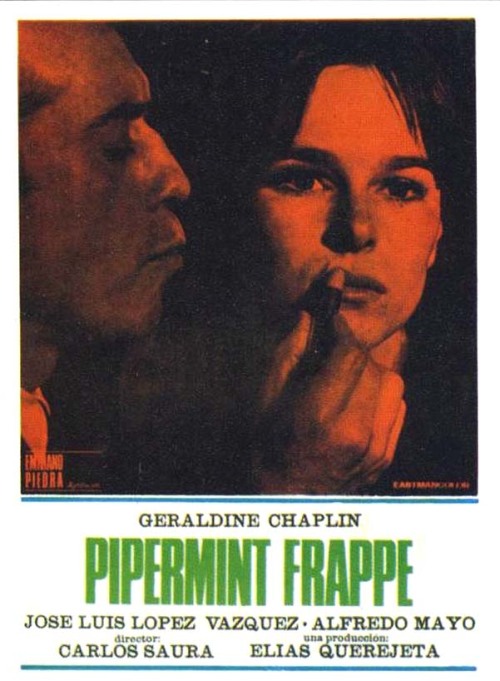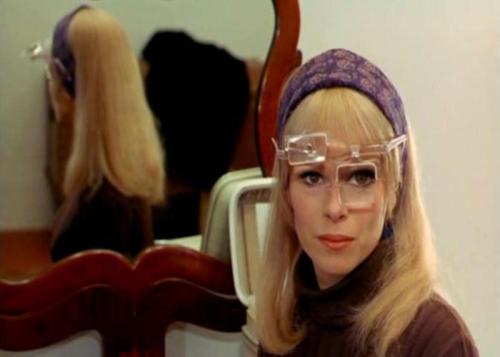Peppermint Frappé follows the doctor Julián (José Luis López Vázquez) in his pursuit of Elena (Geraldine Chaplin), the glamourous new wife of his best friend Pablo (Alfredo Mayo). Elena proves to be a difficult prize to obtain, so Julián induces Ana, the shy nurse he works with (also Geraldine Chaplin, excellent in double roles), to become an imitation of Elena, feeding his obsession until he wins over the real thing.
Pygmalion, originally a stage play by George Bernard Shaw, was adapted for the screen by the playwright himself. Professor Henry Higgins (Leslie Howard), a master of dialect and accent, bets that he can transform the poor "guttersnipe" Eliza Doolittle (Wendy Hiller, in a star performance) into a society lady whose origins none would question.
The comedic drama of Pygmalion trots at fine speed, with dialogue and images flying fast until particular moments demand more settled, slow emphasis. The psychological tension of Peppermint Frappé creeps onto the screen, beginning with a title sequence set over fashion photos cut for collage. The action is set at a meandering pace; but judicious use of sharp cuts, soundtrack, and intense 360-degree spirals gently draw the viewer into unsettling emotional territory.
In Peppermint Frappé, the camera subtly blends Julián's stalker gaze with a distanced perspective that monitors his movements. If Julián cannot possess Elena's body, then he can possess her essence: through photographs, through her personal effects, and through Ana. These are visual and tactile ties to Elena. Julián's apartment is richly furnished, every object handled with meticulous attention to proper appearance and use. He also keeps a room in an abandoned mansion in the country, yet while the rooms he uses are clean and well-decorated, the rest of the home is left to ruin. Julián has an expert eye for crafting places and people into his idea of perfection, but has no care for what does not please him.
Shaw's reworking of the ancient Greek legend has the Pygmalion figure, Henry Higgins, craft his Galatea figure Eliza through speech instead of sculpture. This shift from a visual to verbal focus is an ingenious method of adaptation to the stage, where dialogue reigns. Though dress and gesture are also important in Eliza's transformation, words are Professor Higgins' forté, and serve as the entry point for his social experiment. Unlike Julián, Higgins initially embarks on this project with only his personal pride in mind. Higgins selects Eliza out of the challenge given by her low-class accent and place in society, not the looks and unapproachable aura of Elena or the desperate nature of doppelganger Ana. When Higgins realizes that he is falling in love with Eliza, it not the perfect society doll he desires, but the independent Eliza, who appreciates the skills she's gained but violently defends her status as an independent human being.
Both Julián and Henry are selfish and think little of the feelings of their female subjects. These men either overlook or never realize their own flaws, though both films present them as far from faultless. The intended audiences of the men's experiments differ: Henry holds his "improvement" of Eliza to his impossible standards but he seeks to make Eliza perform for those in high society. Julián's efforts are only for himself. (One makeup scene makes the viewer wonder if, as a balding and withdrawn middle-aged man, he ultimately jealous of the beauty of young women. His taste for something as sweet as the title drink suggest a little girl's tastes.) However, one can say that since only Henry and those close to him -who wager that he won't succeed- know the truth behind the elegant Ms. Doolittle, the project is ultimately for entertainment and pride of Henry. What makes Henry Higgins a more appealing protagonist than Julián is that, along with avoiding darker impulses, he is only obsessive about his work and does not seek to possess Eliza.
Elena is the embodiment of '60's mod style, taking her time to maintain her appearance even in private. Whether this effort is for herself or to please the eyes of others is not made clear. Yet her constant upkeep is not Julián's all-consuming devotion; she is a free spirit who enjoys life and her husband's company. Elena's husband may occasionally call her a "child," but they are both honest with each other and the relationship appears to be mutually beneficial. Some might think of Elena as a prototype of the "Manic Pixie Dream Girl" found in indie-oriented literature and film, but Elena's refusal to bend to Julián's will works against the wish fulfillment of that trope. Though Julián finds Ana a malleable stand-in for Elena, their personalities are drastically different, each frustrating Julián in an alternate way.
Eliza, despite her lack of education, has a sound mind that Henry notices in their early meetings. She willingly agrees to take the free elocution and manners lessons Henry offers, and is the one who approaches Higgins after the initial chance meeting. She puts in a greater amount of effort into Higgins' experiment, for both personal pride and her dream of being a respectable owner of a flower shop. Though they live in restrictive societies -1930's England and Franco-era Spain- Eliza and Elena both exercise agency.
Another writer could further this comparison by investigating the films' settings and their varying qualities of the feminine ideal. Yet both films share the theme of pride: both the healthy pride in one's skills and attributes, and the harmful pride that blinds one to reality and to the feelings of others. Peppermint Frappé presents the male gaze as toxic, and serves as a surreal fable about treating women as objects. Pygmalion sets forth the notion that all people, regardless of gender or class, should be treated with respect.
Another writer could further this comparison by investigating the films' settings and their varying qualities of the feminine ideal. Yet both films share the theme of pride: both the healthy pride in one's skills and attributes, and the harmful pride that blinds one to reality and to the feelings of others. Peppermint Frappé presents the male gaze as toxic, and serves as a surreal fable about treating women as objects. Pygmalion sets forth the notion that all people, regardless of gender or class, should be treated with respect.




No comments:
Post a Comment